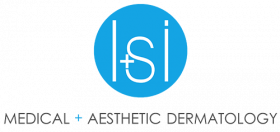
SCHEDULE A CONSULTATION
Schedule by phone at (973) 635-5050
or fill out the online consultation request
By submitting this form you agree to be contacted via phone/email/text
Rosacea Treatments at the Laser + Skin Institute
What is Rosacea?
Rosacea (rose-AY-sha) is a chronic (long-term) skin disease that causes redness and swelling, primarily on the face. Other areas that can be affected are the scalp, neck, ears, chest and back. Sometimes, rosacea affects the eyes.
Those afflicted with rosacea may first notice a tendency to flush or blush easily. The condition can occur over a long period of time and often progresses to a persistent redness, pimples and visible blood vessels in the center of the face that can eventually involve the cheeks, forehead, chin and nose.
Since rosacea causes facial swelling and redness, it is easily confused with other skin conditions, such as acne and sunburn. For this reason, rosacea is known as the “great pretender,” and often incorrectly referred to as “adult acne.”
Who Gets Rosacea?
Rosacea affects an estimated 14 million Americans. Adults, especially those between 30 and 50 years of age who have lighter skin, blonde hair and blue eyes, are most likely to suffer from rosacea. However, rosacea can affect children and people of any skin type.
Rosacea is often passed on in families, with women being afflicted more often than their male counterparts. Men, however, often get more severe forms of rosacea. For women with rosacea, increased flushing and blushing may occur around and during menopause.
Famous rosacea sufferers include W.C. Fields and former President Bill Clinton, both often captured on film with the classic mid-face redness and bumpiness of rosacea. These classic signs of rosacea are often misidentified as 78 percent of Americans, according to a Gallup survey, do not know that rosacea exists.
Psychological Effects
Some believe the social and emotional effects of rosacea are worse than the physical symptoms. In one survey, 1 nearly 70 percent of rosacea patients said it lowered their self-confidence and self-esteem. Forty-one percent said the condition caused them to avoid public contact or cancel social engagements.
Causes
While the precise cause of rosacea remains a mystery, researchers believe that heredity and environmental factors are to blame. One explanation is that something causes the blood vessels to swell. The result, these scientists believe, is the flushing and redness characteristic of rosacea.
Another theory is that a mite called Demodex folliculorum, which lives in hair follicles, could be a cause of rosacea. The belief is that the mites clog oil glands, which leads to the inflammation seen in rosacea. Others believe that a bacterium called Helicobacter pylori, which causes intestinal infection, might be a cause.
The immune system also has been implicated as playing a role in rosacea’s development.
What should I do if I suspect I may have Rosacea?
To schedule an appointment with our Physicians, fill up the form below or call our scheduling staff at 973-635-5050.
SCHEDULE A CONSULTATION
Schedule by phone at (973) 635-5050
or fill out the online consultation request
By submitting this form you agree to be contacted via phone/email/text
SCHEDULE A CONSULTATION
Schedule by phone at (973) 635-5050
or fill out the online consultation request
By submitting this form you agree to be contacted via phone/email/text

